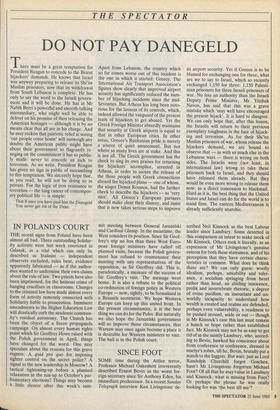IN POLAND'S COURT
THE recent signs from Poland have been almost all bad. Three outstanding Solidar- ity activists were last week convicted in Gdansk, in a trial which can only be described as Stalinist — independent observers excluded, rules bent, evidence apparently fabricated — as if the author- ities wanted to undermine their own claims about the rule of law. Two priests have also been imprisoned, for the heinous crime of hanging crucifixes in classrooms. Changes to the criminal law have made almost every form of activity remotely connected with Solidarity liable to prosecution. Imminent amendments to the Higher Education Law will drastically curb the academic commun- ity's residual autonomy. The Church has been the object of a fierce propaganda campaign. On almost every human rights point which Sir Geoffrey Howe raised with the Polish government in April, things have changed for the worst. One may speculate about the reasons for this grave regress: A quid pro quo for imposing tighter control on the secret police? A signal to the new leadership in Moscow? A tactical tightening-up before a planned relaxation in the run-up to October's par- liamentary elections? Things may become a little clearer after this week's sum- mit meeting between General Jaruzelski and Cardinal Glemp. In the meantime, the West considers its position. Since Sir Geof- frey's trip no less than three West Euro- pean foreign ministers have called off planned visits, because the Polish govern- ment has refused to countenance their meeting with any representatives of the opposition, as Sir Geoffrey did. This is, paradoxically, a measure of the success of Sir Geoffrey's visit. The message went home. It is also a tribute to the political co-ordination of foreign policy in Western Europe — now, rightly, to be formalised in a Brussels secretariat. We hope Western Europe can keep up this united front. In the present circumstances, it is the best thing we can do for the Poles. But naturally we also hope the Jaruzelski government will so improve those circumstances, that Warsaw may once again become a place it is desirable for Western ministers to visit. The ball is in the Polish court.














































 Previous page
Previous page